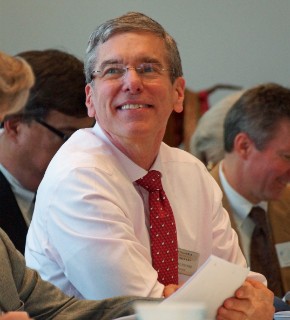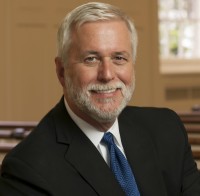Joyful to the end

Steve Hayner is the president of Columbia Seminary in Decatur, Georgia. He’s also a husband, father, grandfather, and close friend from whom I have mostly lived too far away. It now appears that he doesn’t have long to live.
We met over 25 years ago when he served as the president of InterVarsity Christian Fellowship and I was starting my first pastorate at a nearby congregation in Madison, Wisconsin. For the next five years our families met every Sunday night along with two other couples also in ministry. Perched on a sofa and some chairs borrowed from a dining room, we always went around the circle to check in with each other. I’ve wracked my brain to pull up those conversations, but what I remember is that I enjoyed being in a place where I wasn’t the pastor. This was when sabbath began for me, as I rested in the sanctuary of dear friends.
Over the years Steve and I have done the best we could at showing up for each other’s big events. I officiated at his daughter’s wedding. He was front and center when I was installed as a seminary president last year. He’s about ten years older than I am and was always a lap or two ahead of me in our careers. So I called him from time to time to get advice. Last February we joined three other seminary presidents in a van that rambled around the West Bank looking for ways to be of service.
Read our latest issue or browse back issues.
It was on Easter, ironically, that Steve began to feel ill. He went to the doctor and was diagnosed with pancreatic cancer. He threw himself into an aggressive chemo treatment. But recently he wrote that the duration of his life on earth is a matter of weeks or months. He’s lost a tremendous amount of weight.
Columbia Seminary has been fabulous in caring for its president. The Caringbridge website that Steve and his wife Sharol use to keep friends informed about his condition has been filled with affirming and prayerful responses. I follow this regularly but was knocked out the day the Hayners sent out a photo of themselves on a sofa with five grandchildren on their laps—everyone is laughing. As long as I’ve known Steve he’s signed his letters with the word joyfully before his name. Nothing’s changed about that: he believes that in life and death we belong to God.
In his latest e-mail he wrote, “Both grief and joy knock us about like outsized ocean waves. The waves take us by surprise but also remind us of what it means to be human—and pursued by grace.”
Someone asked him how he was planning to spend the months ahead. Several people have suggested that he write a book; they have lots of opinions on what he should write about. He wrote, “Honestly, there is not much joy for me in writing.” Instead he’s decided to focus the energy he has on a “daily calling.” He wants to assist in the remodeling of the house where Sharol will live. He wants to be intentional about how he gives away his library, and, as is clear from the photograph, he wants to laugh with his grandchildren.
Sharol sometimes also writes posts in which she thanks people for their prayers. In a recent one she wrote, “Last Sunday night our five-year-old granddaughter Anna asked her mom and dad when she might get her regular grandpa back. This led to a conversation with Anna and seven-year-old Claire about Papa’s prognosis and the new body that Jesus would give him in heaven. Anna said, ‘I wish I knew if Jesus was going to heal him here or in heaven. But I know that Jesus keeps his promises. We can trust him.’”
Well, there it is. When I think about all that Steve Hayner still has to offer the kingdom of God, I go a little crazy trying to figure out why Jesus has to wait until heaven to heal him. Why not here and now? He’s done it before. And what about all of the prayers that have bombarded heaven’s door? But a central part of our faith is the almost daily reminder that we are not Jesus and aren’t even called to understand him. The call is just to “trust him,” as Anna reminds us. So it has always been in the history of the church in prayer.
When I read Anna’s words it was almost as if I was back in Madison over 25 years ago with my old friends in ministry. One of us would describe a mission that was going down in flames. We would protest that we had offered so many prayers about it. “Jesus shouldn’t have to wait for heaven to heal the church,” we would say. And at the end of the dark night Steve would say something prophetic about choosing to live joyfully.
It is breathtaking to watch people prepare to die as they lived. This is what gives credibility to a church that teaches its grandchildren that when it comes to Jesus “we can trust him.”




